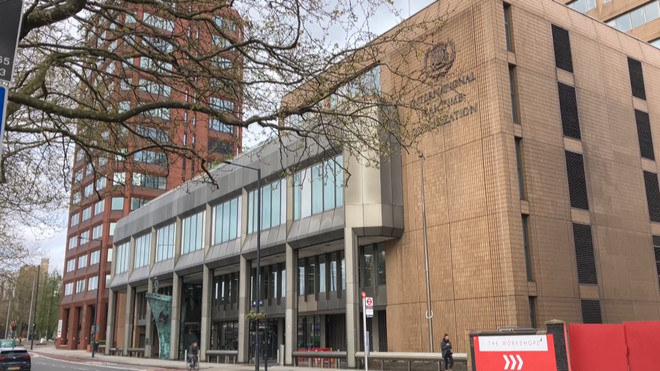 IMO Secretary General Arsenio Dominguez grants an interview to Vietnam News Agency reporters in London (Photo: VNA)
IMO Secretary General Arsenio Dominguez grants an interview to Vietnam News Agency reporters in London (Photo: VNA) London, (VNA) - According to Secretary General of the International Maritime Organisation (IMO), Arsenio Dominguez, attacks against seafarers in the Red Sea causing such incidents as the sinking of Rubymar and the True Confidence attack pose serious threats to global maritime security, as well as the security and maritime trade for the coastal states in the region.
In a recent talk with Vietnam News Agency correspondents in the UK at IMO head office in London, the IMO Secretary General stressed that attacks against seafarers are completely and categorically unacceptable. He sent deepest condolences to the families of those who lost their lives in the True Confidence attack on March 6, including a Vietnamese citizen.
The IMO Secretary General pointed out the first impact of these attacks is on seafarers before any impacts on trade, affirming the first focus of the organisation is the safety of seafarers who are doing their jobs, providing for the world trade to continue to flow.
The attacks also have negative impacts on the global trade given that shipping transports more than 80% of overall trade volume in goods, with around 15% of global trade flow passing through the Red Sea every year. Because of the attacks, ships are now forced to sail around the Cape of Good Hope in South Africa in longer route, as a result, increasing not only costs of freights but the emissions from ships that IMO is working very hard to reduce, the IMO Secretary General said, adding the incidents have far-reaching economic implications, posing a direct threat to global supply chains. Prolonged disruptions in container shipping could lead to delayed deliveries, high costs and inflation, potentially affecting energy security and food security.
In terms of the marine environment, the sinking of the Rubymar in early March after it was attacked on February 18 not only causes pollution but at the same time also has negative effect on the safety of navigation because it represents a hazard to other ships in the area where trade flows regularly, Secretary General Dominguez said.
He said IMO is working through the UN Office for the Coordinator of Humanitarian Affairs (UN OCHA), together with UNEP, UNEP-OCHA’s Joint Environment Unit and the Emergency Mutual Aid in the Red Sea and the Gulf of Aden (EMERSGA) to provide technical support and backstopping to the team deployed to support the Government of Yemen, in the event of a possible spill of fuel or cargo from the sinking ship.
IMO is also utilising some of the measures that the organisation adopted over 10 years ago to combat piracy and robbery off the coast of Somalia in the Gulf of Aden, the IMO Secretary General said, adding the organisation is gathering experience and expertise to evaluate and probably revise the guidance of the organisation to provide additional support for the protection of the seafarers on board.
He said IMO is closely monitoring the developments in the Red Sea and undertaking constant dialogue and diplomacy to try to ensure that seafarers, ships and cargo are protected.
The organisation serves as an essential forum for bringing together stakeholders, including governments, partners and UN agencies to share information, find solutions and provide assistance, as needed, especially long-term support to build the capacity of regional and national bodies to strengthen maritime security in the Red Sea, through legislation, maritime security strategies and information-sharing networks.
IMO also has several projects to work on the implementation of safety and security measures in relation to IMO instruments as well as other regulations, including the Djibouti Code of Conduct which is created and established to enhance the maritime domain from the safety and security aspects of all the countries in the region. In that way the countries around the Red Sea can also be better prepared to face any future challenges.
The Secretary General said this year, IMO is celebrating safety achievements and the theme for the year is “Navigating the future safety first”, with particular focus on the safety of seafarers- the engines that keep shipping, moving and trading.
He said a slogan that he picked up not long ago “No shipping, no shopping” can now be expanded into “No seafarers, no shipping, no shopping” to further raise public awareness about the importance of not only shipping, but also safeguarding of seafarers all over the world./.





























